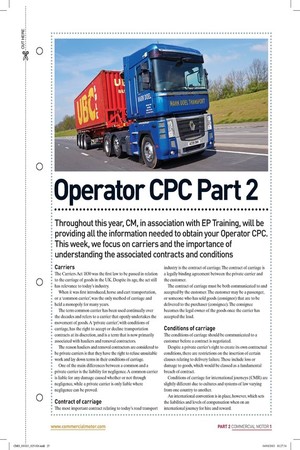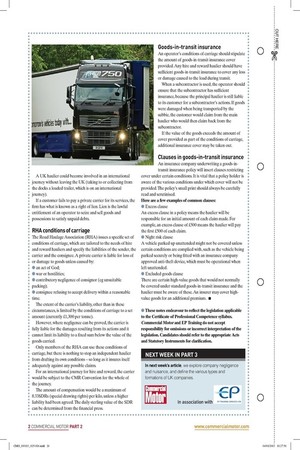Operator CPC Part 2
Page 18

Page 19

If you've noticed an error in this article please click here to report it so we can fix it.
Throughout this year, CM, in association with EP Training, will be providing all the information needed to obtain your Operator CPC. This week, we focus on carriers and the importance of understanding the associated contracts and conditions Carriers The Carriers Act 1830 was the first law to be passed in relation to the carriage of goods in the UK. Despite its age, the act still has relevance to today's industry.
When it was first introduced, horse and cart transportation, or a 'common carrier', was the only method of carriage and held a monopoly for many years.
The term common carrier has been used continually over the decades and refers to a carrier that openly undertakes the movement of goods. A 'private carrier', with conditions of carriage, has the right to accept or decline transportation contracts at its discretion, and is a term that is now primarily associated with hauliers and removal contractors.
The reason hauliers and removal contractors are considered to be private carriers is that they have the right to refuse unsuitable work and lay down terms in their conditions of carriage.
One of the main differences between a common and a private carrier is the liability for negligence. A common carrier is liable for any damage caused whether or not through negligence, while a private carrier is only liable where negligence can be proved.
Contract of carriage The most important contract relating to today's road transport industry is the contract of carriage. The contract of carriage is a legally binding agreement between the private carrier and the customer.
The contract of carriage must be both communicated to and accepted by the customer. The customer may be a passenger, or someone who has sold goods (consignor) that are to be delivered to the purchaser (consignee). The consignee becomes the legal owner of the goods once the carrier has accepted the load.
Conditions of carriage The conditions of carriage should be communicated to a customer before a contract is negotiated.
Despite a private carrier's right to create its own contractual conditions, there are restrictions on the insertion of certain clauses relating to delivery failure. These include loss or damage to goods, which would be classed as a fundamental breach of contract.
Conditions of carriage for international journeys (CMR) are slightly different due to cultures and systems of law varying from one country to another.
An international convention is in place, however, which sets the liabilities and levels of compensation when on an international journey for hire and reward.
A UK haulier could become involved in an international journey without leaving the UK (taking to or collecting from the docks a loaded trailer, which is on an international journey).
If a customer fails to pay a private carrier for its services, the firm has what is known as a right of lien. Lien is the lawful entitlement of an operator to seize and sell goods and possessions to satisfy unpaid debts.
RHA conditions of carriage The Road Haulage Association (RHA) issues a specific set of conditions of carriage, which are tailored to the needs of hire and reward hauliers and specify the liabilities of the sender, the carrier and the consignee. A private carrier is liable for loss of or damage to goods unless caused by: • an act of God; • war or hostilities; • contributory negligence of consignor (eg unsuitable packing); • consignee refusing to accept delivery within a reasonable time.
The extent of the carrier's liability, other than in these circumstances, is limited by the conditions of carriage to a set amount (currently £1,300 per tonne).
However, where negligence can be proved, the carrier is fully liable for the damages resulting from its actions and it cannot limit its liability to a fixed sum below the value of the goods carried.
Only members of the RHA can use these conditions of carriage, but there is nothing to stop an independent haulier from drafting its own conditions — so long as it insures itself adequately against any possible claims.
For an international journey for hire and reward, the carrier would be subject to the CMR Convention for the whole of the journey.
The amount of compensation would be a maximum of 8.33SDRs (special drawing rights) per kilo, unless a higher liability had been agreed. The daily sterling value of the SDR can be determined from the financial press.
Goods-in-transit insurance An operator's conditions of carriage should stipulate the amount of goods-in-transit insurance cover provided. Any hire and reward haulier should have sufficient goods-in-transit insurance to cover any loss or damage caused to the load during transit.
When a subcontractor is used, the operator should ensure that the subcontractor has sufficient insurance, because the principal haulier is still liable to its customer for a subcontractor's actions. If goods were damaged when being transported by the subbie, the customer would claim from the main haulier who would then claim back from the subcontractor.
If the value of the goods exceeds the amount of cover provided as part of the conditions of carriage, additional insurance cover may be taken out.
Clauses in goods-in-transit insurance An insurance company underwriting a goods-intransit insurance policy will insert clauses restricting cover under certain conditions. It is vital that a policy holder is aware of the various conditions under which cover will not be provided. The policy's small print should always be carefully read and scrutinised.
Here are a few examples of common dauses: • Excess clause An excess clause in a policy means the haulier will be responsible for an initial amount of each claim made. For example, an excess clause of £500 means the haulier will pay the first £500 of each claim.
• Night risk clause A vehicle parked up unattended might not be covered unless certain conditions are complied with, such as the vehicle being parked securely or being fitted with an insurance company approved anti-theft device, which must be operational when left unattended.
• Excluded goods clause There are certain high-value goods that would not normally be covered under standard goods-in-transit insurance and the haulier must be aware of these. An insurer may cover highvalue goods for an additional premium. • • These notes endeavour to reflect the legislation applicable to the Certificate of Professional Competence syllabus. Commercial Motor and EP Training do not accept responsibility for omissions or incorrect interpretation of the legislation. Candidates should refer to the appropriate Acts and Statutory Instruments for clarification.









































